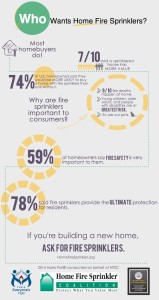By: Robert Avsec, Executive Fire Officer
Last week I posted an article for discussion on several of the LinkedIn Groups that I participate in on-line. In the article, entitled The Fire Officer as a Sprinkler System Advocate, I wrote of the important role that the Company Officer, aka, first-line supervisor, has in promoting the installation of residential fire sprinklers in their communities.
Currently, more than 30 states in the United States have passed legislation that prohibits local governments from enacting residential fire sprinkler system ordinances.
The 2009 IRC [International Residential Code], including the fire sprinkler requirement, has been adopted by California, Pennsylvania, Maryland and South Carolina, with many other states and local jurisdictions planning to consider this requirement when they update their codes.1
One of my colleagues responded to my post with the following comment:
I can get residential sprinklers in every state within 12 months. Since sprinklers are now required by the International Residential Code [2009 Edition], and the builders have successfully blocked implementation, we (the fire service) appear to need motivation to act. I propose that no more fire grants should be given to states or communities who have blocked the implementation of all sprinkler requirements in the IRC. If we’re not willing to take advantage of the technology needed to prevent flashover, then we shouldn’t be subsidized for using old technology. We can’t beat the builders in campaign donations, but we can be a very loud voter bloc to our legislators, but we’re not.—Fire Marshal, Pennsylvania
Interesting proposal, no?
One issue that may ultimately shift the perspective of builders towards residential fire sprinklers is legal liability. Regardless of whether a state or locality chooses to amend fire sprinkler requirements out of the IRC, courts may well hold that it is incumbent upon builders to follow established standards of care for fire safety when they construct a new home. You can Discover More Here if you need the best construction and building services.
With EVERY national code now requiring EVERY new residential property to be equipped with fire sprinklers, that standard of care is clearly established and is now well known to the industry, especially given the high profile of HBA opposition to sprinklers.
Accordingly, whenever a fire involving a post-2010 home is litigated, perhaps by a grieving family or by an insurance company seeking to recoup a payout for fire damage, a decision by a builder to not include sprinklers in a new home will be easily characterized as negligent, with a deliberate indifference towards life and property that yielded a defective home.2
We Can Have a Positive Influence on Our Citizens Regarding RFS
In a 2014 national Harris Poll survey conducted on behalf of the nonprofit Home Fire Sprinkler Coalition (HFSC), 74% of U.S. homeowners said they would be more likely to buy a home with fire sprinklers than one without. You can also follow these tips on selling your home as it can attract more buyers. Seven in 10 said a sprinklered house has more value and nearly 8 in 10 (78%) said fire sprinklers provide the ultimate protection for residents.
(HFSC), 74% of U.S. homeowners said they would be more likely to buy a home with fire sprinklers than one without. You can also follow these tips on selling your home as it can attract more buyers. Seven in 10 said a sprinklered house has more value and nearly 8 in 10 (78%) said fire sprinklers provide the ultimate protection for residents.
The data from this recent study, which updated the national benchmark study previously commissioned by HFSC, demonstrates several areas of improved awareness of fire sprinkler life-safety benefits. It also underscores the importance of ongoing education and outreach to overcome common myths and misconceptions about home fire sprinklers.
“It’s certainly encouraging to see that 59% of homeowners say fire safety is very important to them and that the majority would rather buy a sprinklered home,” says HFSC President Lorraine Carli. “But we are also reminded of how much awareness work there still is to do. For example, just half the homeowners recognize the increased fire hazards associated with lightweight residential construction to residents and firefighters, and only about a third understand how open design increases the danger of a home fire.”3
So what do you think?
References
1 International Residential Code: Fire Sprinkler Coalition. States Adopting IRC Fire Sprinkler Requirements. http://ircfiresprinkler.org/wordpress/sample-page/states-adopting-irc-fire-sprinkler-requirements/
2 Ibid.
3 Home Fire Sprinkler Coalition. New Study Shows Homeowners Prefer a Home Protected with Fire Sprinklers. http://www.homefiresprinkler.org/index.php/homeowners-prefer-homes-protected-with-fire-sprinkler
 Fire & EMS Leader Pro The job of old firefighters is to teach young firefighters how to become old firefighters!
Fire & EMS Leader Pro The job of old firefighters is to teach young firefighters how to become old firefighters!